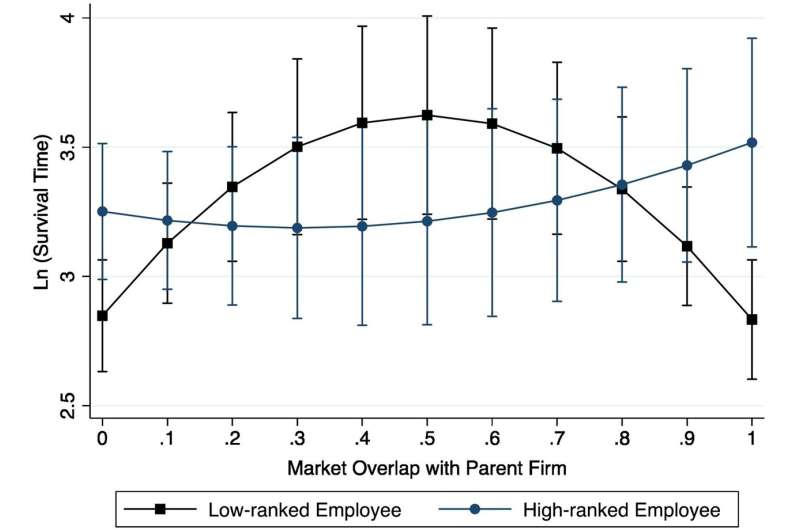This article has been reviewed according to Science X's editorial process and policies. Editors have highlighted the following attributes while ensuring the content's credibility:
fact-checked
trusted source
proofread
Study finds that employee start-ups must balance competing forces to ensure they don't fail

A new study, led by Bayes Business School, found that there are sizeable costs and benefits for spinouts—stand-alone new firms founded by former employees of established firms—as they try to establish themselves in the market.
The research, which looked at 117 spinouts, from 103 established firms, finds that the degree to which spinouts' operating markets overlap with their parent companies has positive, but diminishing effects on their likelihood of survival.
Findings reveal that staying close to the parent company is beneficial to spinouts because it allows them to benefit from know-how and resources gained by founders through their prior experience. However, a high level of overlap with the market domains of the parent companies may spark some hostile actions, thereby creating disruptive competition that, in turn, may lower the spinouts' chances of survival.
Additionally, the research explains that the survival of employee start-ups could be dependent on the previous rank of their founders when employed in established firms. Examples of successful spinouts include US tech giants Intel and AMD.
On the upside, spinouts launched by high-ranked employees benefit from a more substantial level of knowledge and resources inherited from the parent companies. Moreover, high-ranked employees possess greater bargaining power, which allows them to negotiate more favorable exit conditions at the time of departure. On the downside, these spinouts may face a higher risk of falling into competency traps, which locks them into the old logic, thus hindering their ability to acquire new resources or develop new routines that are more suitable for their targeted markets.
The report was led by Dr. Aliasghar Bahoo-Torodi, Lecturer in Entrepreneurship at Bayes, who said employees thinking about starting their own companies need to be aware of the contrasting forces at work in searching for the right balance between the uncertainty entailed by entering new market domains and the risk of dealing with the parents' hostile actions.
"From the parent companies' perspective, employees' transition to entrepreneurship can be cause for serious concern," said Dr. Bahoo-Torodi. "This is because, in addition to the loss of important human capital, spinouts may pose a serious competitive threat. To protect their competitive position in the market, parent companies are likely to retaliate and adopt a hostile attitude toward employee start-ups that attack their vital markets.
"Our study suggests that by minimizing the degree of market commonality, spinouts can obscure their visibility and mitigate their competitive threat in the eyes of the parent firms. This could play a big role in reducing the parents' motivation to undertake aggressive actions."
"When do spinouts benefit from market overlap with parent firms?" is published in the Journal of Business Venturing.
More information: Aliasghar Bahoo-Torodi et al, When do spinouts benefit from market overlap with parent firms?, Journal of Business Venturing (2022). DOI: 10.1016/j.jbusvent.2022.106249
Provided by City University London





















